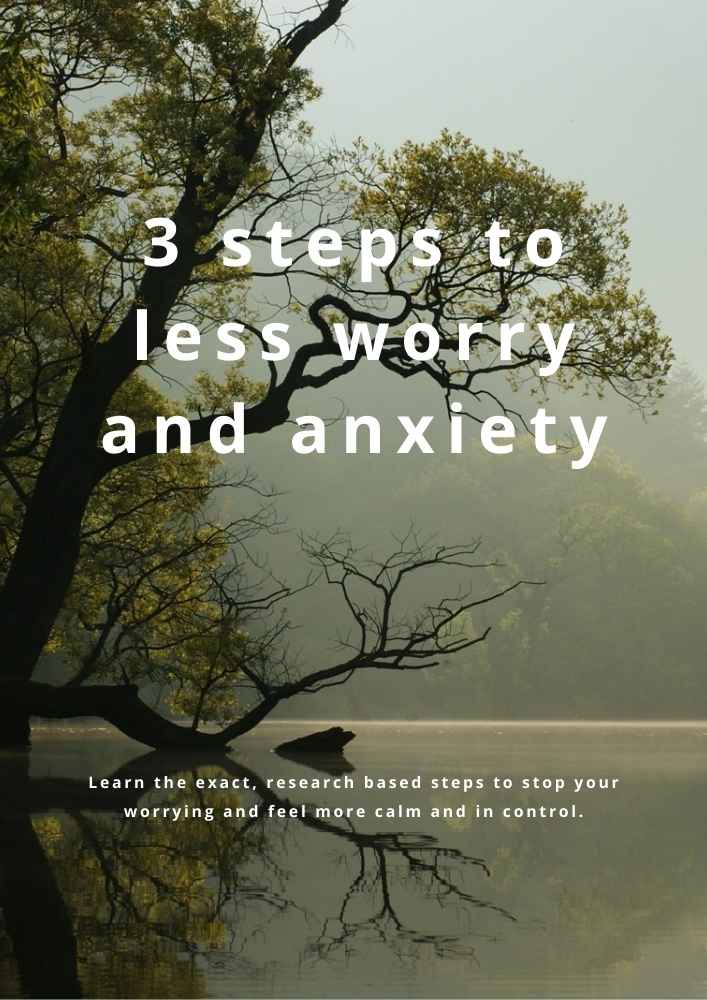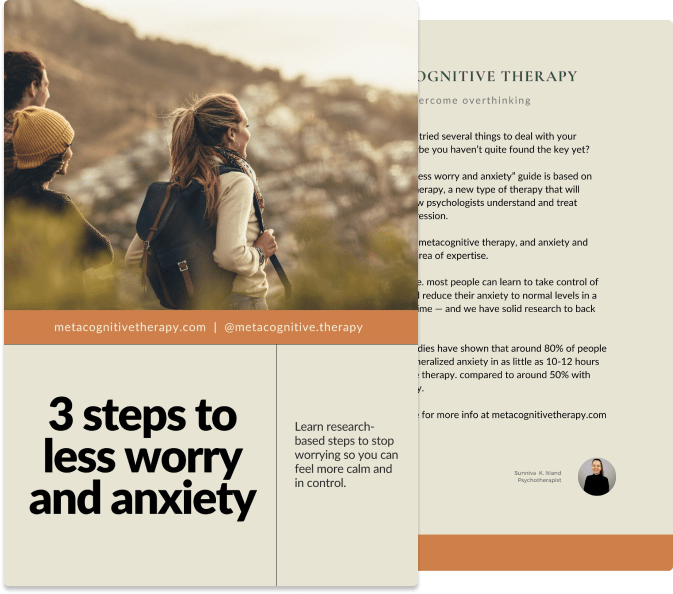How to heal from heartbreak (and the reason you’re stuck)

Download our best tips on reducing anxiety and worrying
Learn three powerful metacognitive therapy steps to stop the worry cycle, reduce anxiety, and feel calmer in everyday life.
.jpeg)
.jpeg)
Whether it stems from a painful breakup or unrequited love, heartbreak can be a devastating experience to navigate. The loneliness, grief, hopelessness and sadness can feel completely overwhelming for some time after a relationship ends.
But for some people, these emotions don't fade with time as expected — they continue to be painfully present.
The truth is, there's no predetermined timeline for healing. Rather than time itself, what determines how long you struggle depends on how much time you spend overthinking your breakup and the coping strategies you use to manage your grief.
What perpetuates heartbreak?
You might unknowingly intensify or prolong your heartbreak through well-intentioned but counterproductive mental habits: Endlessly rethinking the breakup, replaying conversations, or wondering what went wrong. Maybe you obsess over what your ex said, or torture yourself wondering if you could have done something differently.
This can extend into toxic behaviours like stalking your ex on social media, asking mutual friends for updates, or obsessively checking their online activity. These constant behaviours of monitoring your ex are digital wounds that will prevent natural healing.
Some people also become hypervigilant about potential future heartache, leading them to avoid new connections entirely or shut themselves off emotionally to protect themselves from being hurt.
When heartache becomes all-consuming (repetitive, obsessional, and time-consuming) it crosses into pathological territory, impacting friendships and leading to avoidance behaviours that prevent you from moving on.

Download our best tips on reducing anxiety and worrying
Learn three powerful metacognitive therapy steps to stop the worry cycle, reduce anxiety, and feel calmer in everyday life.
Reopening the wound
Your mind actually has as a natural self-healing ability. Just like your body can mend a cut without your interference, your mind can process and recover from grief without you actively engaging in the process.
So when you engage in unhelpful thinking and coping mechanisms, you're essentially scratching that wound repeatedly, preventing it from healing naturally.
The trap of trigger thoughts
When you’re navigating a heartbreak, you might find yourself ruminating over repetitive thoughts like, 'I'll never find love again,' 'I wasn't good enough for them,' 'I'm not lovable,' or 'This was all my fault.'
These thoughts might feel urgent and important, but indulging them just deepens your suffering.
Beliefs that keep you stuck
Metacognitive Therapy (MCT) identifies specific beliefs (metacognitions) about thinking that can keep you stuck in prolonged heartbreak. These might sound like:
- My grief shows how much I loved my ex.
- Moving on means I didn't truly love them.
- Reducing how much I think about an ex means I’m forgiving them.
- I can't stop thinking about it.
- If I don't actively think about the breakup (trying to 'solve' or 'understand' it) I won't be able to process my emotions or I might forget something important.
- I need to control negative thoughts about not finding someone else, or they might come true.
- Worrying and over-analyzing will keep me prepared for future heartbreak.
Beliefs like these aren’t helpful, and can keep you stuck in a cycle of pain and reliving your heartbreak. It’s important to challenge these beliefs: For example, you can continue dating even if you believe that 'I'm broken' — the thought doesn't have to control your actions.
Practical strategies for moving on
The path to recovery from a difficult heartbreak starts with self-compassion and acceptance. Try to see your emotional pain as a normal part of the healing process, instead of trying to eliminate it prematurely. Grieving a breakup is totally normal, so you don't need to fight or change these feelings. Negative emotions may feel upsetting, but they won't actually harm you.
If you feel like you have no control over your negative thinking, the key is discovering that you can reduce rumination and worry. Metacognitive Therapy practices like detached mindfulness (observing thoughts about your ex or future relationships, without engaging in them) can help you discover that your thinking is within your control. We all have the ability to redirect our attention and choose which thoughts to linger on — you can test this with experiments like rumination postponement, where you set aside specific times to revisit these thoughts rather than letting them dominate your entire day. (When you arrive at your “worry window”, you’ll usually find you don’t need to use it, but you’ve proven to yourself that you were able to decide when to engage in those thoughts).
It’s also important to focus on redirecting your energy toward behaviours that promote your wellbeing and healing. Rather than withdrawing, spend time with supportive friends, engage in new activities, and gradually reduce avoidance behaviours that are keeping you isolated.
Healing from heartbreak isn't about forcing yourself to 'get over it' quickly or erase the past. It's about learning to relate to your thoughts and emotions in a way that lets your mind regulate and heal naturally. When you stop picking at the wound of heartbreak, you create space for peace and recovery.
Wondering if Metacognitive Therapy can help you feel better? Take this quiz to find out.



